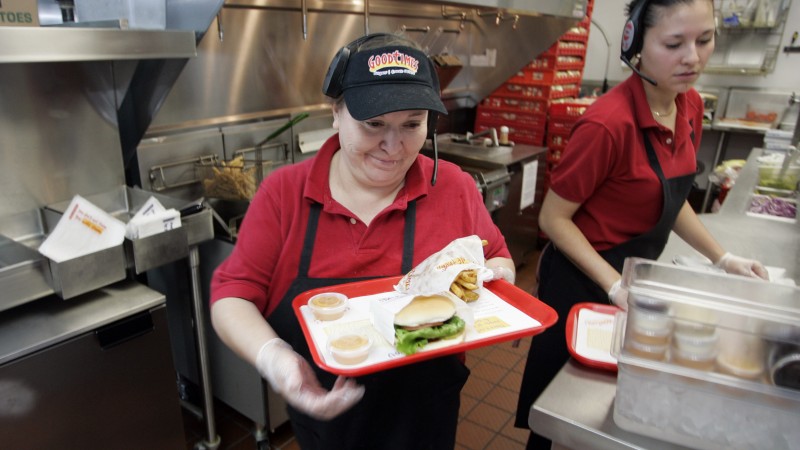
The fast food industry maintains a more extreme wage disparity between workers and CEOs than any other industry in the economy, according to a report by the public policy organization Demos published Tuesday.
In many cases, income gaps surpass a 1,000-to-1 ratio, a factor that not only impoverishes millions of fast food workers and their families across the country, but also hurts the overall economy, says the report—Fast Food Failure: How CEO-to-Worker Pay Disparity Undermines the Industry and the Overall Economy.
Between 2000 and 2013, the average CEO’s paycheck quadrupled, with averages coming in around $23.8 million. This is a stark comparison to hourly wages of fast food employees, which increased 0.3% since 2000, and currently averages around $9 per hour, the report shows.
This extreme income disparity also poses a risk to the fast food companies themselves, Demos notes. As workers have increasingly risen up over the past year in protest of their poverty wages and poor working conditions, “legal, regulatory, and operating risks” have become a problem for fast food companies.
“The fast food industry is leading the trend of pay disparity in the US, and the negative consequences are surfacing as operational issues, legal challenges, and diminishing worker and customer satisfaction,” said Catherine Ruetschlin, Demos Policy Analyst and author of the report. “Even the industry leader McDonald’s has acknowledged that rising inequality is a risk to their bottom line. These performance issues can manifest in reduced shareholder returns, but the problems extend beyond fast food to the rest of the economy.”
This was evident in March of this year when fast food giant McDonald’s said at its annual filing to the Securities and Exchange Commission that labor organizing campaigns could “promote adverse perceptions of … our brand” and listed it as a profit “risk.”
According to the report, “Millions of dollars in legal fees, increasing customer wait times, and labor unrest are evidence of the systemic problems of income inequality in fast food.”
Additionally troubling, the report’s finding show that extremely low paying jobs, particularly in the fast food industry, make up a large proportion of job growth since the economic crash of 2008 and will be among the top five occupations expected to add the most jobs through 2022.
“The increasing reliance on employment in these highly unequal industries will make it harder for working people to share in the gains of economic growth as more and more income becomes concentrated at the top,” the report states.
It continues: “The paycheck of the average fast food worker would leave a family of three below the federal poverty line, even if she works 40 hours a week, which is far from the norm in the industry. At an average $9.09 per hour, a full-time, full-year employee earns less than $19,000 a year. But most fast food workers are hired on a part-time basis, making it unlikely that their annual incomes will even approach that sum. At the bottom of the wage scale, the erosion of the real value of the minimum wage has excluded those earners from the benefits of economic growth and the success of the industry.”
“These findings suggest an escalation of income inequality over the next decade, and a break from the kind of employment opportunities that supported middle-class living standards in the past,” Demos concludes.
______________________

